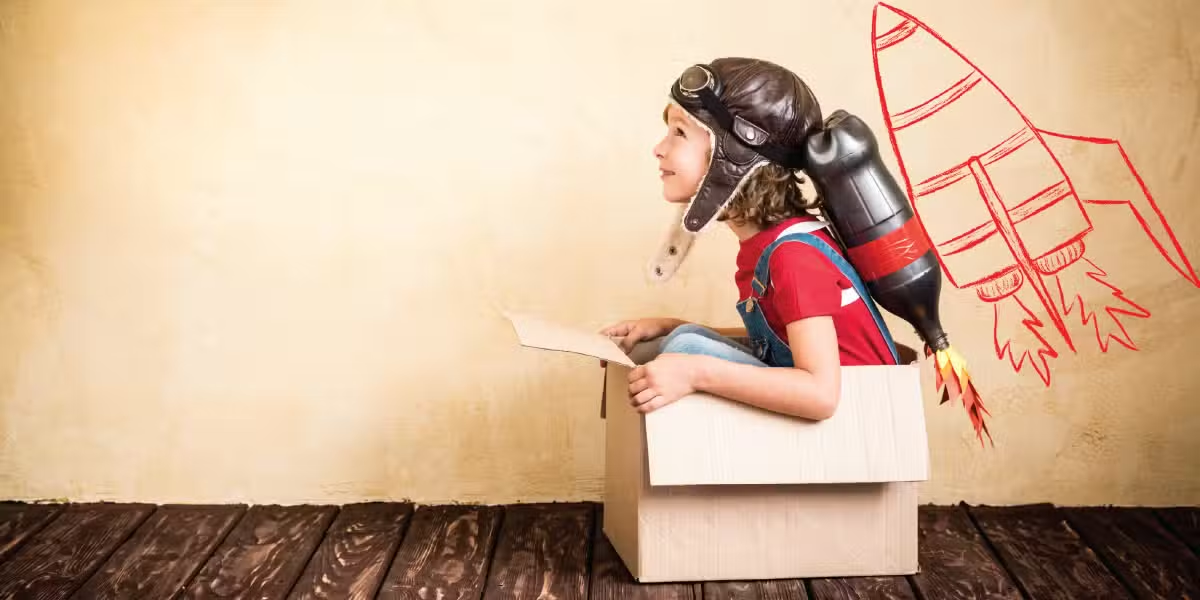My 3-year-old son wakes up each day in a world of magic and potential.
He’ll empty decks of cards and place them under his wooden train tracks, which he surrounds with cups and bowls. The point? I have no idea. But in his mind perhaps he’s constructed an intricate subway system through a bustling metropolis. He’ll grab his golf putter and drag stools, chairs, weights, books, toys, anything that stirs his imagination into the living room.
“Watch this, Da Da,” he’ll say, lowering his eyebrows in determination, hitting his plastic golf ball around the obstacles toward a nonexistent target. He’ll tell Amazon’s Alexa to “puh-way (play) ‘Go Cubs Go’ on Spah-fye (Spotify)” for the 50th time that day, then jump excitedly once it begins, as if to “know it for the first time,” as T.S. Eliot wrote. He’ll build for hours, directing his workhorse employee (me) to arrange his racetracks, train tracks, or marble tracks (it’s always tracks) into the impossible design he sees in his limitless mind.
My wife and I spend our evenings cleaning.
Sometimes I can struggle to enter fully into my son’s world, my mind preoccupied with work, something to accomplish, obsessing over the future, or even struggling to enter into the impracticality of a miniature golf course without a hole or an impossible train route that goes from “there” to “up there” to “down there” to “all the way over there, Daddy!” He’s blissfully lost in his imagination, while I’m thinking about how we’ll run out of tracks, or about an email I need to check, or about a bill to pay.
Heightening Our Awareness
I attribute this mental “stuckness” to our tendency to be machinelike in our existence: more linear and practical, more ends-to-a-means in our actions. But this extends to other areas of life as well. To be a machine is to be controlled: maybe by expectations (either ours or others’) or, particularly in our culture, by money, advancement, demands, or even our own judgments of ourselves.
Before we know it, we spend our days reacting to our own programming. There’s an analogy from Franciscan Father Richard Rohr that has always resonated with me: how we tend to “push the river” (attempting to control it) rather than surrender to its flow. It’s really no surprise that our dependence on machines is making us more machinelike.
To be aware of abundance permeating our beautiful world and lives—our very reality—without desiring to control that reality could also be called open-hearted prayer. And imagination and creativity help us heighten our awareness of a grace-filled and divine-soaked reality.
The great satirist and science fiction writer Kurt Vonnegut returns often in his work to haunting depictions of humanity’s increasing resemblance to (and dependence on) machines. In a scene in Breakfast of Champions (1973), one of his characters, the artist Rabo Karabekian, concludes a quasi-theological speech by exclaiming, “Our awareness is all that is alive and maybe sacred to any of us. Everything else about us is dead machinery.” Vonnegut calls Karabekian’s speech the “spiritual climax” of the book.
In a sense, Vonnegut models the awareness Karabekian is advocating for by admitting that he did not expect one of his own characters he has written into existence—this machine, if you will—to surprise him in such a way, perhaps inviting readers to, like Vonnegut, also reflect on the awareness that brings us to life. The fact that this scene flowed from Vonnegut’s imagination charts a path for each of us: the power of the imagination to surprise us, to spin us out of control, to heighten our awareness of our own abundant reality.
Imagination As a Spiritual Tool
Through my son’s eyes, when I’m aware of their invitation to me, I’m reminded of what it means to really live in a world filled with magic and potential, “charged with the grandeur of God,” as the poet Gerard Manley Hopkins once wrote. I’m reminded that imagination, which comes so naturally to my son, can be a spiritual tool in my own life as well, helping me to adopt a more prayerful, which is to say aware, stance toward an abundant reality, helping me to disconnect my machinelike wiring and become more wholehearted and human again.
On a recent episode of Franciscan Media’s Off the Page podcast, poet Angela Alaimo O’Donnell reflected on a 2023 speech Pope Francis delivered to her and a group of artists. “The divine is superabundant, and the imagination is a channeling of the divine,” she noted.
May we seek to adopt an imaginative and prayerful stance toward an abundant reality. May creativity help us to mine that reality and heighten our awareness of grace. May we build impossible train routes and miniature golf courses without holes. May we see through the eyes of little ones and allow them to surprise us with spiritual truths. May we, as one of Vonnegut’s characters pleads with his creator at the end of Breakfast of Champions, be made young in heart and mind.
Prayer
Ever-flowing fountain of love, diversity, and grace, it is so easy for me to forget the beautiful abundance of this world and my life. I can become so stuck in my programming and mental loops, tasks, and demands, that I am blind to grace in my midst. Your presence is all around me, but sometimes I am not present to this mystery. Help make me young in heart and mind. Give me the courage to create and imagine and play freely in the fountain of your love.

Prayer Prayer Prayer Prayer Prayer Prayer Prayer


1 thought on “The Imagination’s Pathway to Prayer ”
Thank you Stephen for this article and you testimony! It is inspiring! Continue to enjoy and marvel your son !